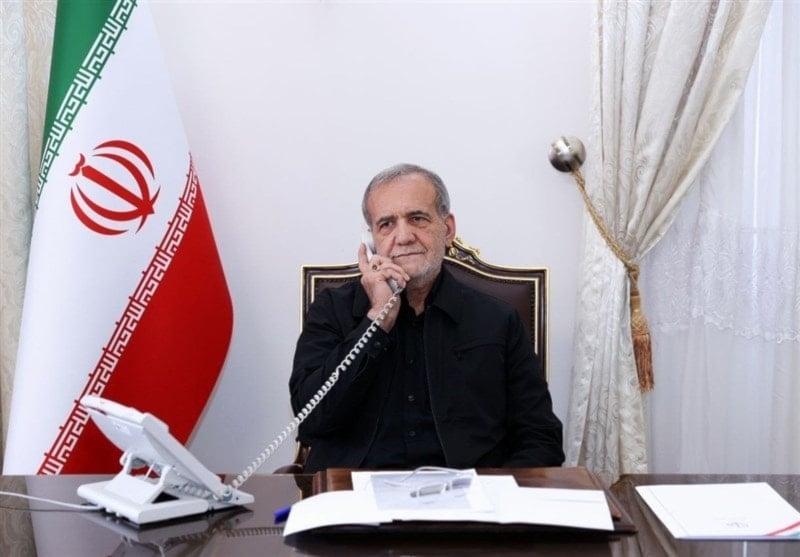Pezeshkian calls for trust-building in JCPOA revival
Charles Michel expressed the EU's desire to enhance relations with Iran and hoped for the resumption of effective cooperation based on common interests.
-

Iranian President Masoud Pezeshkian pictured in his office (Tasnim news agency)
Iranian President Masoud Pezeshkian told European Council President Charles Michel in a phone conversation on Monday that the revival of the Joint Comprehensive Plan of Action (JCPOA) is achievable if all the parties involved prioritize mutual interests and work to build trust with one another.
According to Press TV, Pezeshkian told Michel that if each side fulfills its commitments and establishes a foundation of confidence, it would not only make it possible to restore the JCPOA but also open the door for discussions on other important issues beyond the nuclear agreement.
"If the two sides fulfill all their obligations and build confidence, they can discuss other issues (of common interests) in addition to the revival of the nuclear agreement," Pezeshkian was quoted as saying.
Read more: EU decision to retain sanctions 'illegal' per JCPOA obligations: Iran
The Iranian leader also criticized the double standard policies of the US and some EU countries, arguing that these inconsistent approaches have empowered "Israel" to carry out more severe actions in Gaza and other parts of the region.
"The Islamic Republic of Iran has always supported peace, tranquility and stability across the world and for all nations and believes that any trend in any part of the world that endangers these values should be stopped," Pezeshkian said, adding that US policies aimed at pressuring countries like Iran undermine efforts for global peace.
Charles Michel, on his part, expressed the EU's desire to enhance relations with Iran and hoped for the resumption of effective cooperation based on common interests.
Addressing the ongoing war on Gaza, Michel stressed the need to respect humanitarian rights, halt Israeli attacks, establish a ceasefire, provide aid to Gaza, and recognize an independent Palestinian state.
Read more: Iran vows response if nuclear watchdog approves censure: AEOI chief
Policy plans
Upon winning the elections in early July, Pezeshkian published an op-ed piece in the Tehran Times which he outlined his government's outlook and policy.
In the piece, he said his policy would focus on opportunities to maintain balanced relations with all nations in line with Iran's economic and national interests, in addition to the needs of regional and global peace and security, saying he "will welcome sincere efforts to alleviate tensions and will reciprocate good-faith with good-faith."
He also expressed criticism towards neighboring countries depleting their resources through engaging in unnecessary competition, arms races, or "containment" efforts against each other.
"Instead, we will aim to create an environment where our resources can be devoted to the progress and development of the region for the benefit of all."
Pezeshkian mentioned that, following the victory of the Islamic Revolution in 1979, Iran "severed ties with two apartheid regimes, Israel and South Africa," a decision "motivated by respect for international law and fundamental human rights."
While "Israel" remains an "apartheid" regime to this day, Pezeshkian said it added genocide to "a record already marred by occupation, war crimes, ethnic cleansing, settlement-building, nuclear weapons possession, illegal annexation, and aggression against its neighbors."

 3 Min Read
3 Min Read








